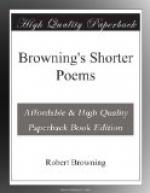He died in Venice, on December 12, 1889, and was buried in the poet’s corner of Westminster Abbey.
[Footnote 1: Sharp’s Life of Browning.]
BROWNING AS POET
The three generations of readers who have lived since Browning’s first publication have seen as many attitudes taken toward one of the ablest poetic spirits of the century. To the first he appeared an enigma, a writer hopelessly obscure, perhaps not even clear in his own mind, as to the message he wished to deliver; to the second he appeared a prophet and a philosopher, full of all wisdom and subtlety, too deep for common mortals to fathom with line and plummet,—concealing below green depths of ocean priceless gems of thought and feeling; to the third, a poet full of inequalities in conception and expression, who has done many good things well and has made many grave failures.
No poet in our generation has fared so ill at the hands of the critics. Already the Browning library is large. Some of the criticism is good; much of it, regarding the author as philosopher and symbolist, is totally askew. Reams have been written in interpretation of Childe Roland, an imaginative fantasy composed in one day. Abstruse ideas have been wrested from the simple story of My Last Duchess. His poetry has been the stamping-ground of theologians and the centre of prattling literary circles. In this tortuous maze of futile criticism the one thing lost sight of is the fact that a poet must be judged by the standards of art. It must be confessed, however, that Browning is himself to blame for much of the smoke of commentary that has gathered round him. He has often chosen the oblique expression where the direct would serve better; often interpolated his own musing subtleties between the reader and the life he would present; often followed his theme into intricacies beyond his own power to resolve into the simple forms of art. Thus it has come about that misguided readers became enigma hunters, and the poet their Sphinx.




